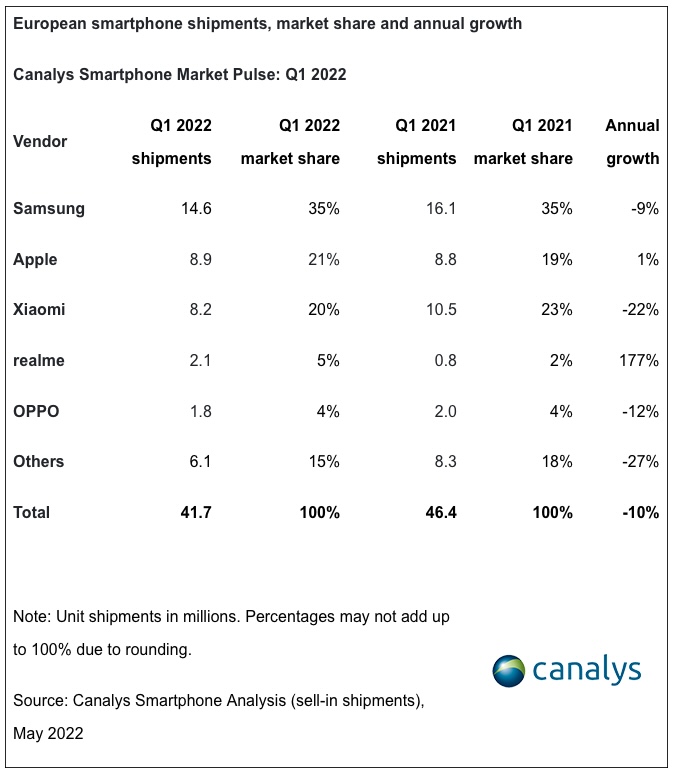
The impact of the Russian invasion of Ukraine saw European smartphone shipments fall 10% year-on-year in the first quarter of the year, according to a new report today.
The global chip shortage played a role, but the latest market intelligence data said that the war was a bigger factor in the scale of the decline …
European smartphone shipments fall
Canalys reports that quarterly smartphone shipments in Europe fell to 41.7M units.
“Most of the decline in Europe was due to Russia and Ukraine being hit hard. Shipments in the countries fell 31% and 51% respectively compared with Q1 2021,” said Canalys Research Analyst Runar Bjørhovde. “Shipments in the rest of Europe only declined 3.5% year on year, showing that demand remains intact. But the ongoing war has driven inflation to a record level and consumer confidence is falling. The real test for the smartphone market will come in the next two quarters, when the economic impact of the war truly starts to be felt.”
But Apple grew market share
Apple was second-placed behind Samsung, and ahead of Xiaomi. Strong iPhone 13 demand saw the Cupertino company boost shipments slightly, from 8.8M in Q1 2021 to 8.9M in the same quarter this year.
Apple’s European market share increased from 19% to 21%, mostly at the expense of Xiaomi.

Inflation and the “great resignation”
Looking ahead, there are concerns about the impact of inflation on demand for expensive consumer electronics products. Sanctions on Russia are impacting everything from energy prices to product distribution. Ukraine is also a major food exporter, so food prices are also increasing as supply falls.
This has seen inflation soar, while the “great resignation” is creating additional inflationary pressure as companies are forced to increase salaries in order to retain and recruit staff. The term was coined by psychologist Anthony Klotz, who successfully predicted the impact of the pandemic on the workforce.
He said three main factors were behind the record rates at which people are quitting their jobs.
- Unleashing of pent-up demand for change, after initial fear-driven stagnation
- People reevaluating their priorities, with work seen as less important by many
- A desire for continued remote working flexibility, which many companies are now ending
This is seeing some people downscale their careers, to either take more time off, or accept a lower salary for a less stressful job – which will reduce discretionary spending power for things like smartphones and tablets. As Klotz told the Financial Times:
“What I kept hearing was, ‘Before the pandemic I arranged my whole life around work’,” says Klotz, but coming out of the pandemic, people said, “I need work to work around my life.”
Photo: Kevin Bhagat/Unsplash
FTC: We use income earning auto affiliate links. More.






Comments